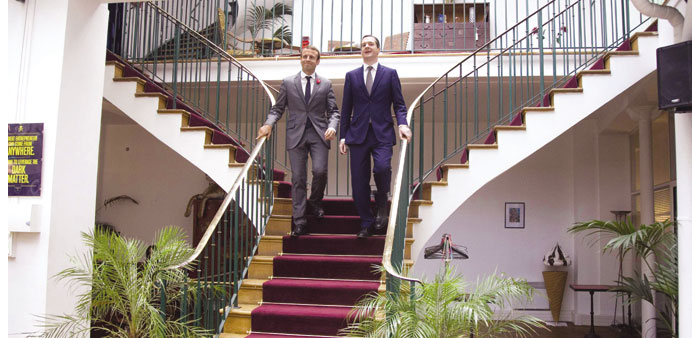Chancellor of the Exchequer George Osborne and French Economy Minister Emmanuel Macron visit the so-called “incubator” of French high-tech start-ups “TheFamily” in Paris, France, yesterday.
Guardian News and Media/London
David Cameron is to stage another round of separate meetings with European leaders this autumn that will be critical to determining whether he thinks he can go ahead with a referendum next year or should instead wait until 2017.
He said the negotiations would determine the date of the referendum, not the other way round. The Chancellor, George Osborne, also held talks in Paris yesterday with his French counterparts.
Cameron said technical discussions were now well under way in Brussels to work on the legal parameters of a deal, and these were going well. The weekly analytical discussions are looking at the legal form to the changes the UK is seeking and whether they would require treaty change, primary legislation or something more modest.
Cameron has accepted that treaty change would not be possible by next year but he could still win a legally binding agreement in writing that treaty change would follow once other EU states had finished their own negotiations about revising governance in the euro area.
But the prime minister wants a further round of talks with key European leaders such as the German chancellor, Angela Merkel, at the end of September to test out how quickly a deal can be struck. He will be able to make a preliminary judgment at an autumn European council meeting but the council’s December get-together is more likely to determine if the prime minister feels he needs to go short or long on the referendum date.
Cameron plans to see Merkel just before the Conservative conference starting on October 4 and the EU council of heads of state on October 15-16. The timing gives him a chance to reveal to a restive conference the state of the negotiations, and the issues on which he is still pressing.
He has already held one round of talks with EU leaders to lay out his demands.
He said: “I am pleased that this process has got under way properly. What is happening now is technical discussions in Brussels between my officials and officials of the European council and the legal secretariat. Those technical discussions are proceeding quite well but there will be lots of difficulties, problems, roadblocks ahead to get the sort of deal that I think is necessary.”
He said the talks would go on through the summer. Sir Ivan Rogers, the British ambassador to the EU, and Sir Tom Scholar, the prime minister’s chief European adviser, are the lead UK negotiators.
Those present at the talks include a rotating team of 12 UK officials from different Whitehall departments, as well as senior figures in the council secretariat, and the cabinet of both the EU president, Donald Tusk, and the EU commission president, Jean-Claude Juncker.
France, often portrayed as the roadblock to a deal, insists it is trying to be helpful, and it has been suggested it is the eastern European states, notably Poland, that will be most hostile due to the British government’s plan to prevent EU citizens living in the UK from receiving tax credits for at least four years.
The talks cover four areas of national sovereignty: vetoes for national parliaments and ever greater union, the relationship between the ins and outs in the euro area, competitiveness and welfare changes to reduce free movement of labour. Cameron said he was determined that regardless of the outcome of the referendum the country had to build stronger trade links across the wider world, and not rely on European markets.
‘Win-win’ scenario possible in EU talks: Osborne
Finance Minister Geroge Osborne yesterday said he believed a “win-win” solution was possible to reform the EU ahead of his country’s in-out referendum, as he kicked off a tour of European capitals. George Osborne said after talks with French Economy Minister Emmanuel Macron: “What we are interested in is a Europe that works for all its citizens, that create jobs. Macron talked about a win-win deal which, I think, we can deliver,” he added. Osborne also met counterpart Michel Sapin and was set to hold talks with Prime Minister Manuel Valls and Foreign Minister Laurent Fabius as Britain tries to drum up support for reforms to a European bloc still reeling from the Greece crisis. The trip came after the Independent on Sunday weekly reported that the referendum on Britain’s EU membership could come as soon as June 2016.

